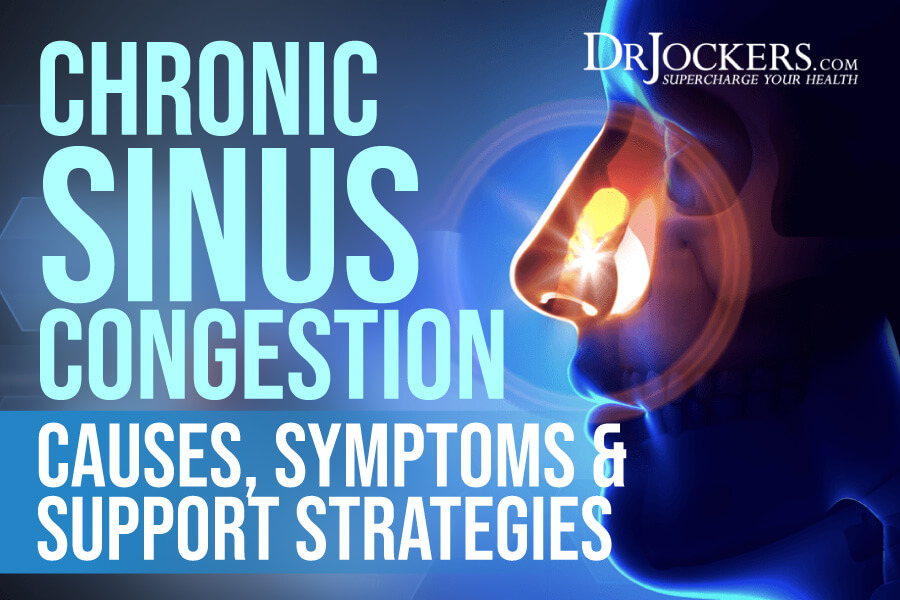 Sinus Congestion: Causes, Symptoms & Support Strategies
Sinus Congestion: Causes, Symptoms & Support Strategies
Are you dealing with sinus congestion? Having a chronic stuffy and runny nose is not fun, yet it is more common than you think. Many people are dealing with chronic sinus congestion due to chronic sinus infections, seasonal and environmental allergies, mold, food sensitivities, and other reasons.
If you are one of those people struggling with chronic sinus congestion, you don’t have to suffer anymore. You can try some natural support strategies to support your immune health and improve your well-being.
In this article, you will learn what sinus congestion is, and I will explain the symptoms and major causes of chronic sinus congestion. I will offer some natural support strategies for sinus congestion to improve your immune system and overall health.
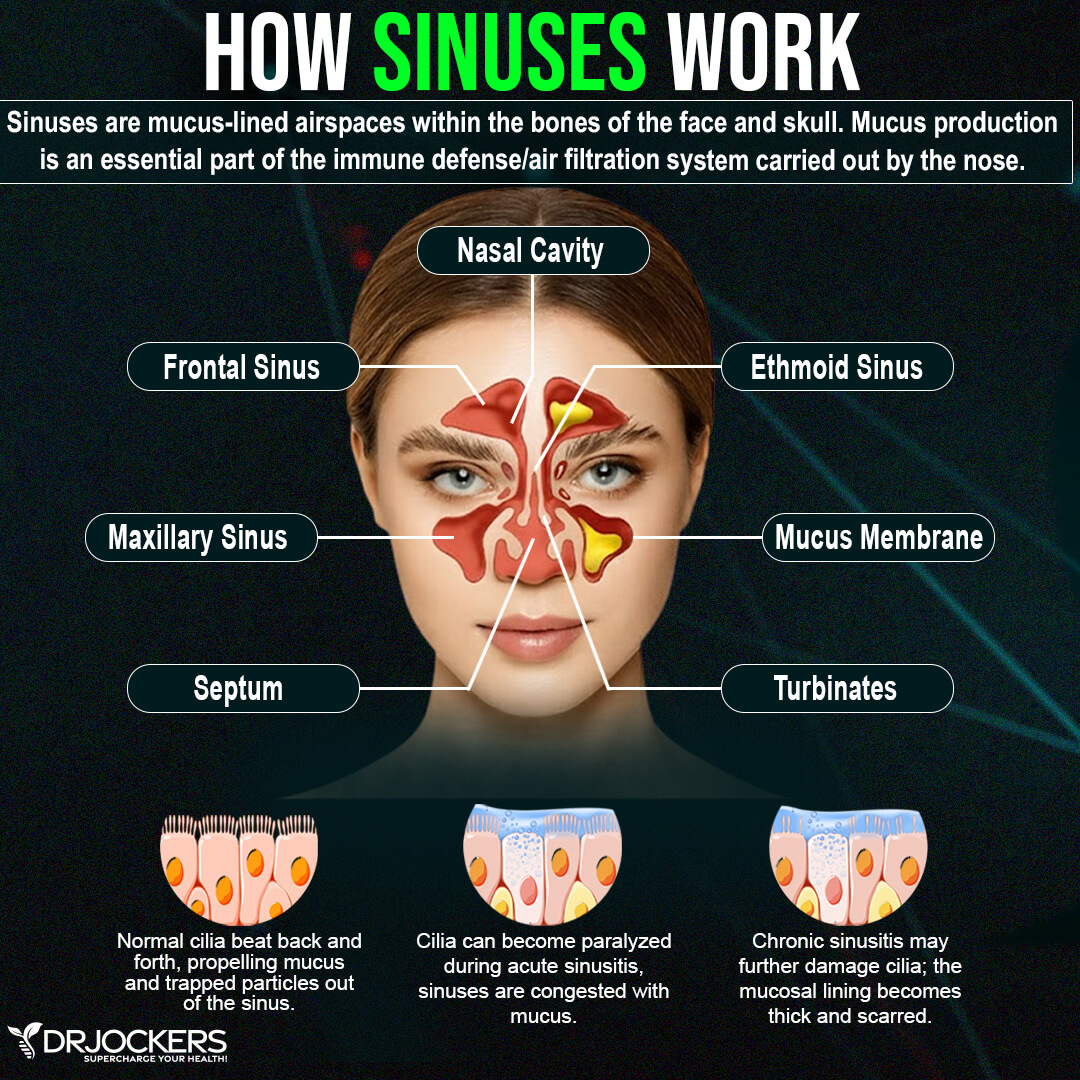
What Is Sinus Congestion
Sinus congestion is a common condition caused by fluid being trapped in your sinuses. This may feel like your sinuses are blocked or painful. It is often accompanied by nasal congestion. Nasal congestion is commonly referred to as a ‘stuffy nose’ because of the stuffy or plugged feeling caused by excess fluid in your nasal and adjacent tissues.
Nasal congestion may or may not be accompanied by nasal discharge or a ‘runny nose’. Besides nasal congestion, sinus congestion may be characterized by a list of other symptoms that you will find in the next section.
Acute or temporary sinus congestion is a well-known symptom of the common cold and sometimes the flu. It is also a symptom of seasonal allergies. However, many people experience chronic sinus congestion due to a number of reasons, including chronic sinus infections, mold, environmental allergies, nasal polyps, food sensitivities, and histamine intolerance (1).
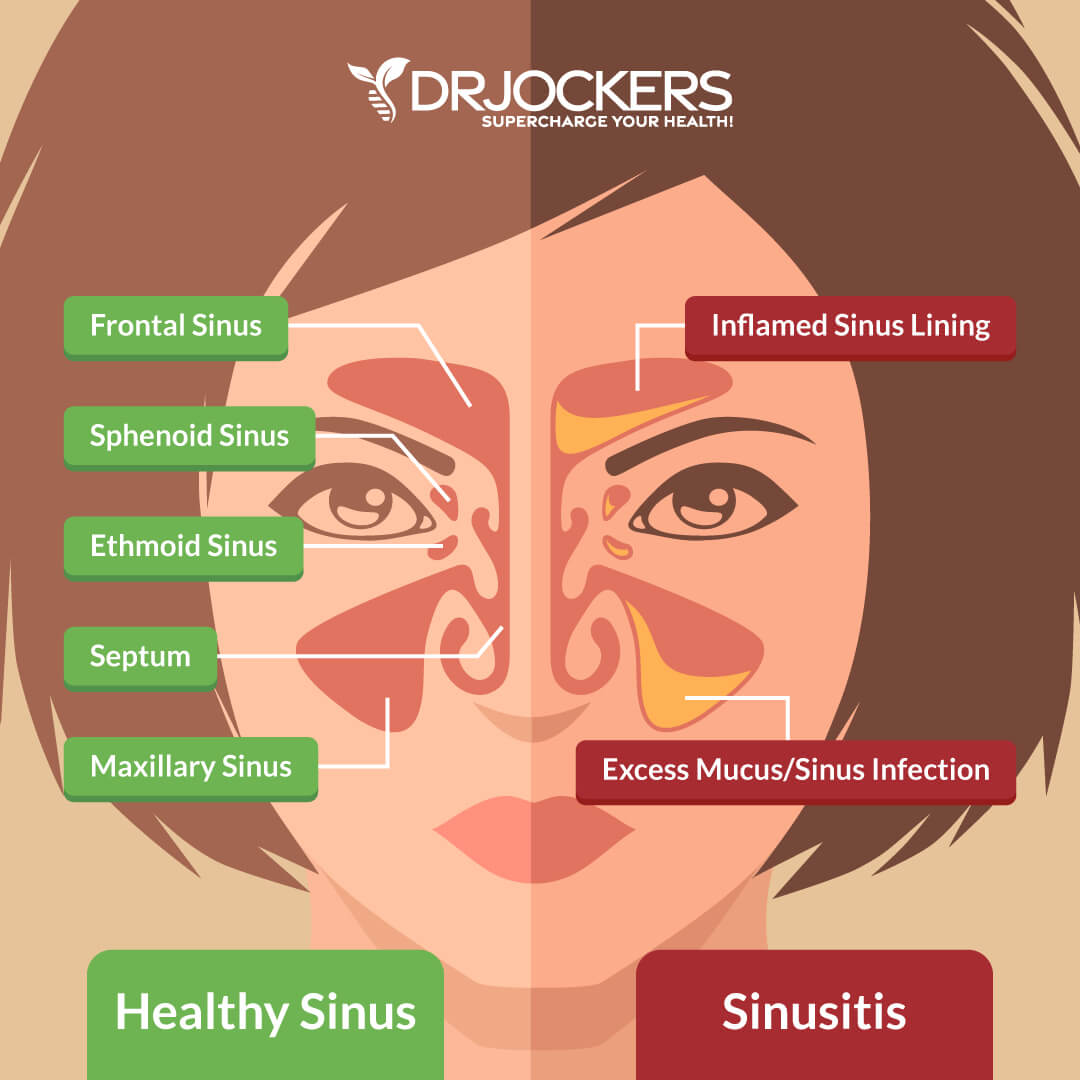
Sinus Congestion Symptoms
If you have sinus congestion, you may experience a number of symptoms, including (1):
- Sinus congestion or stuffy nose
- Nasal discharge or a runny nose
- Post-nasal drip or mucus dripping down your throat
- Facial pain or pressure
- Headache
- Cough
- Sore throat
- Bad breath
- Fatigue
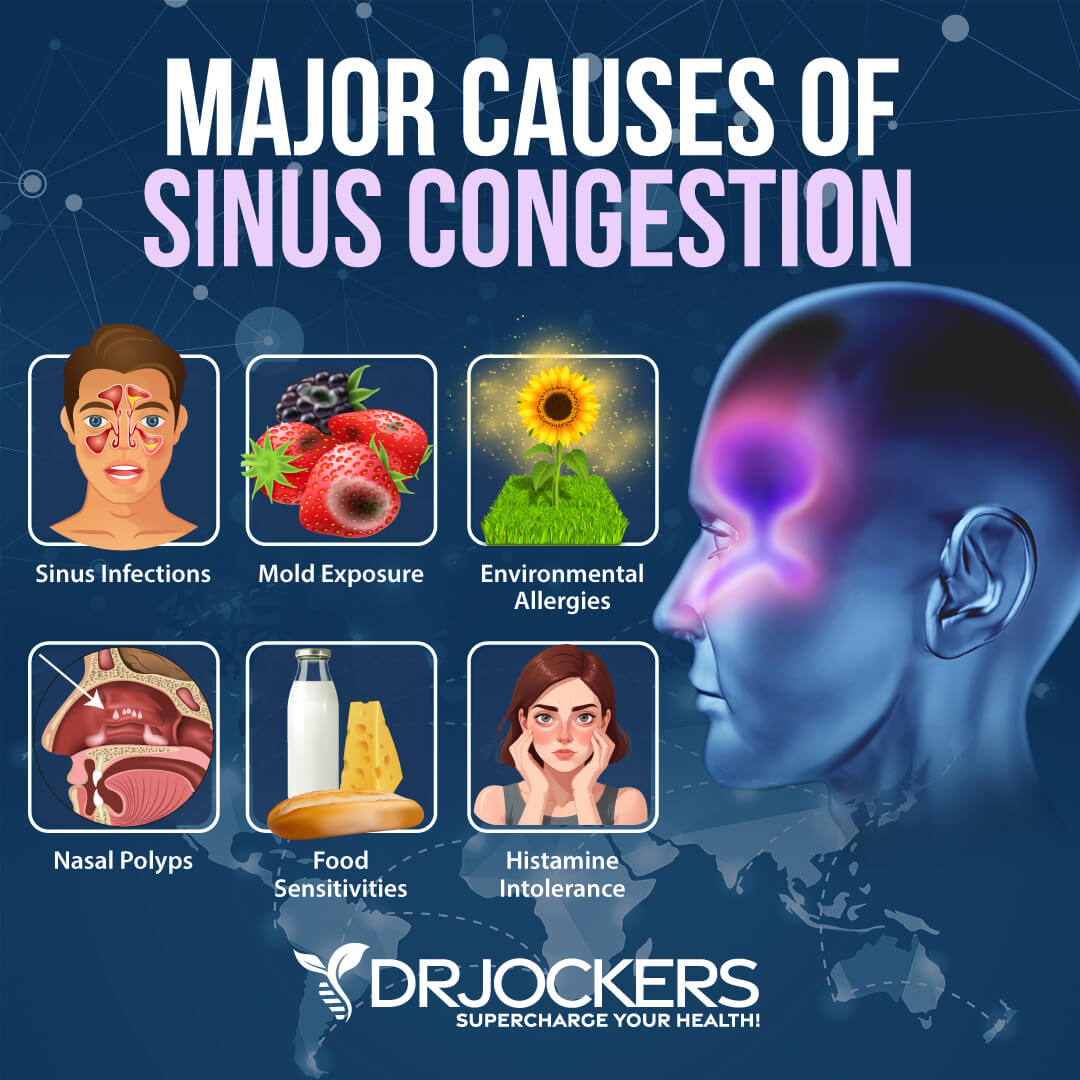
Major Causes of Sinus Congestion
You may develop sinus congestion for a number of reasons. Let’s look at the top major causes of sinus congestion.
Sinus Infections
If you have a sinus infection, it means that your sinus cavities become inflamed, leading to swelling in your sinus tissue. Sinus congestion is one of the main symptoms of sinus infections. You may develop a sinus infection due to the common cold, allergies, nasal polyps, or a shift in your nasal cavity (deviated septum).
You may develop an acute sinus infection as a result of an illness or allergies that may last anywhere between a few days and a few weeks. However, sinus infections can turn chronic, leading to chronic sinus congestion that needs more attention and addressing the root cause of your symptoms (2).
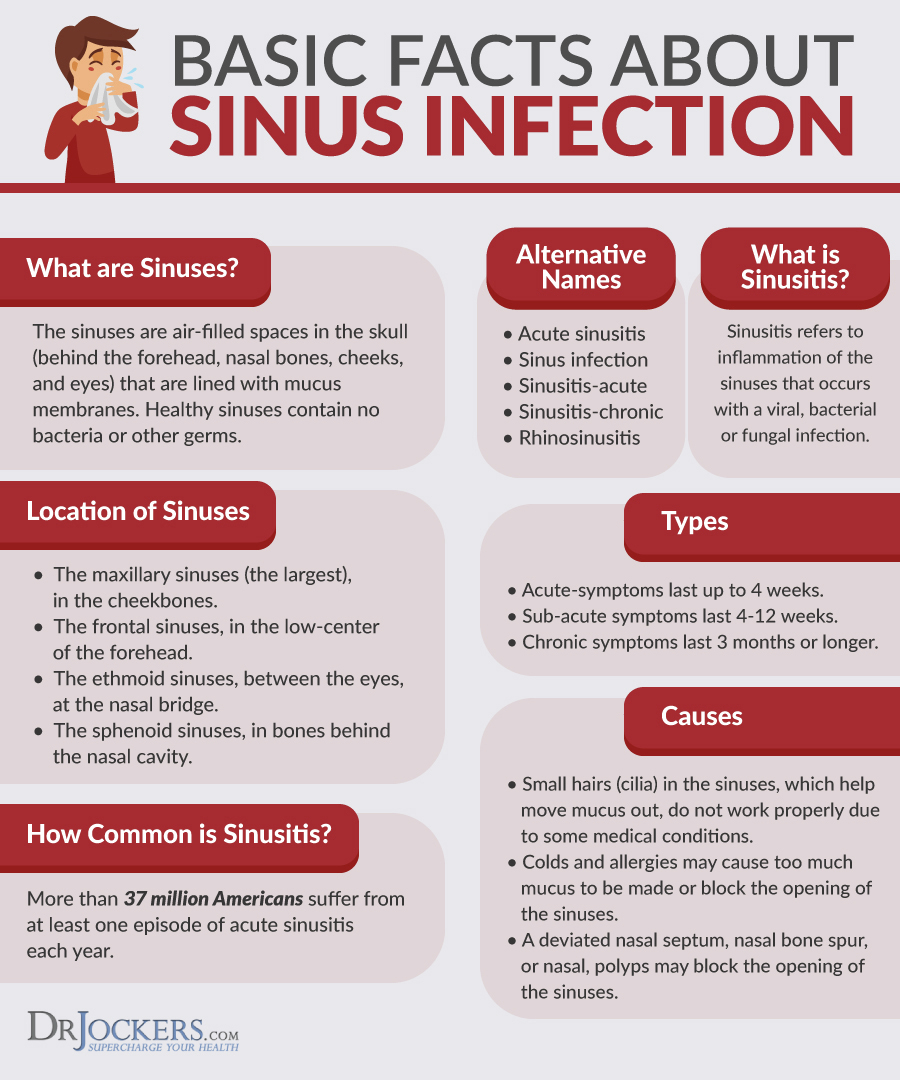
Mold Exposure
Mold is a fungus that can grow and thrive under many conditions and in most places, especially in a warm and moist environment. It is versatile and can grow both indoors and outdoors. Indoor mold is most commonly found in bathrooms, kitchens, and basements where the environment is damp, wet, moist, and warm.
The problem is that even if you have mold in one spot, its microscopic spores can travel and spread far and wide. Mold exposure and mold toxicity can be very harmful to your health. It may lead to chronic sinus congestion, respiratory issues, allergies, headaches, brain fog, fatigue, and other chronic symptoms. To learn more about mold toxicity and how to address it, I recommend reading this article (3, 4).
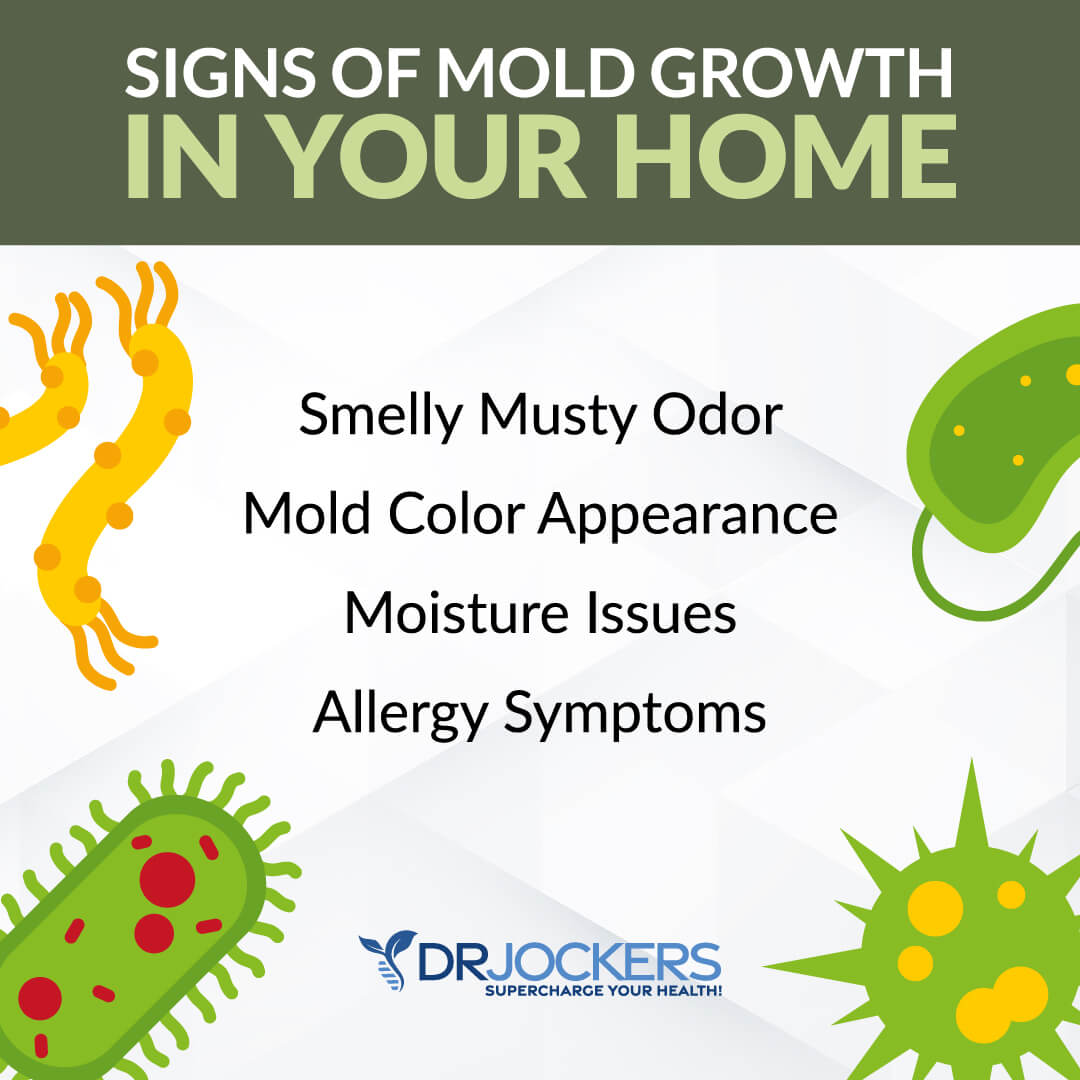
Environmental Allergies
Environmental allergies are your immune system’s reaction to something in the environment that seems harmful to your body. Environmental allergies may lead to sinus congestion, a runny nose, coughing, fatigue, wheezing, headaches, and symptoms similar to the common cold.
Common environmental allergies that you may encounter in your home, other indoor environments, or outside include dust mites, pet dander, pollen, mold, and cigarette smoke. According to a 2005 study, indoor air pollution can be particularly damaging to your respiratory health. To learn more about seasonal allergies, I recommend reading this article, and to learn more about the problems with indoor air pollution, I recommend reading this article (5).
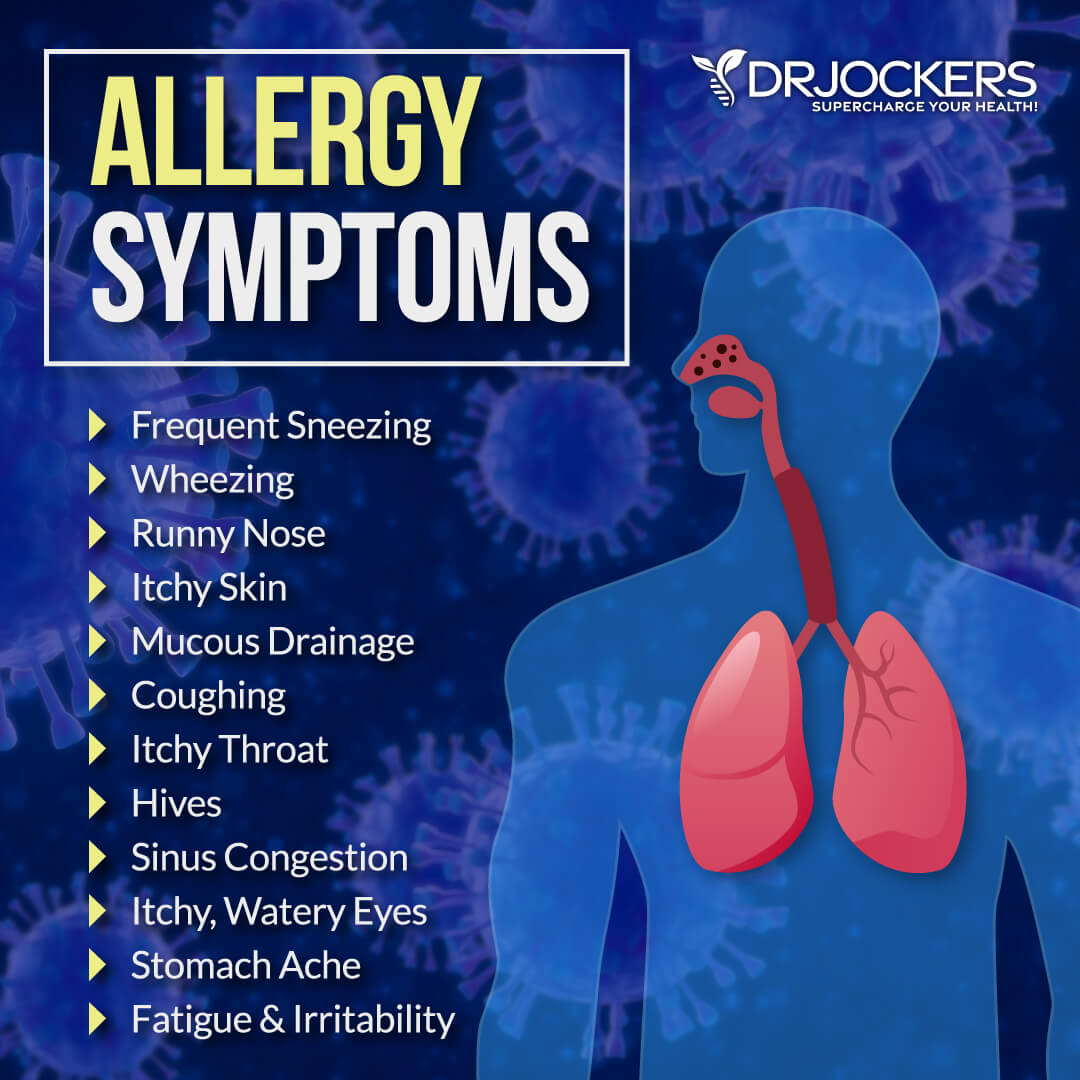
Nasal Polyps
Nasal polyps are small, soft, painless, and non-cancerous growths inside your nasal passages and sinuses. They look like small teardrops that hang like grapes. While they are not dangerous to your health, they can lead to some uncomfortable symptoms.
According to 2008 research, nasal polyps may increase chronic sinus congestion, post-nasal drip, nasal obstruction, or facial pain. Traditional treatment of nasal polyps includes corticosteroids or surgery (6).
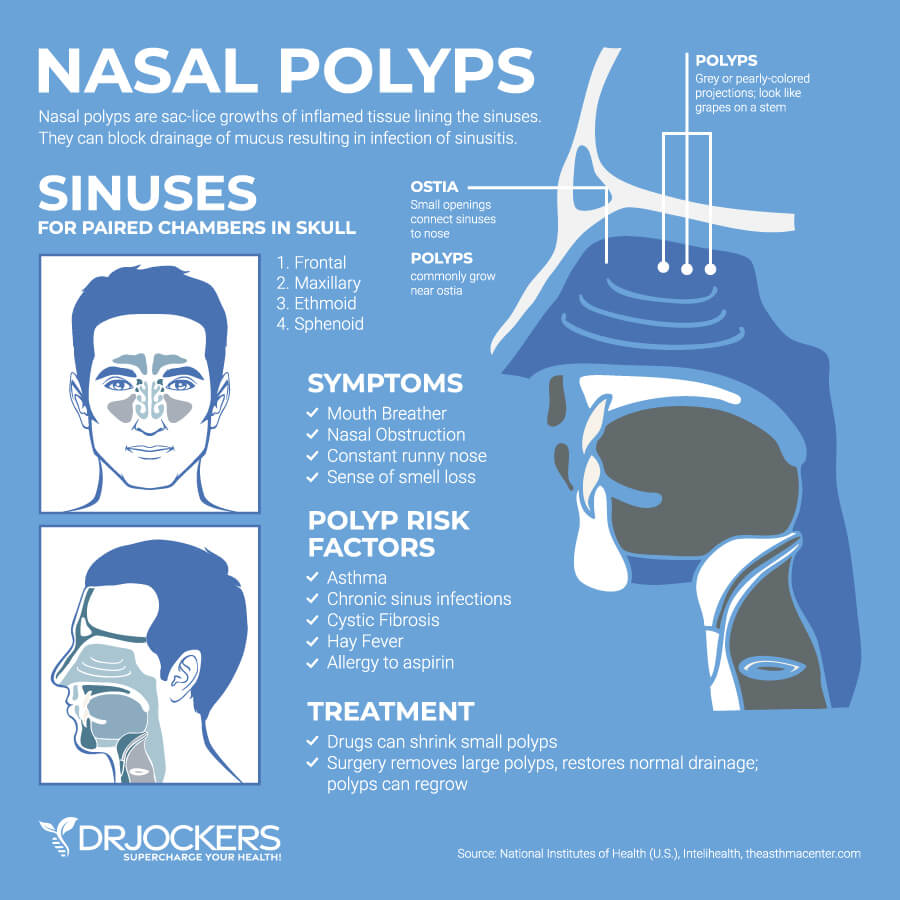
Food Sensitivities
Unlike food allergies, food sensitivities do not tend to cause immediate reactions, such as sudden hives or difficulty breathing. Instead, they lead to chronic symptoms over time as you are consuming foods to which you are sensitive.
One of the common symptoms of food sensitivities is chronic sinus congestion. Other symptoms may include headaches, migraines, digestive complaints, depression, anxiety, brain fog, and fatigue.
Common food sensitivities include wheat, gluten, soy, fish, shellfish, eggs, dairy, peanuts, and tree nuts, however, you may be sensitive to less common foods as well, so discovering and eliminating your personal food sensitivities is critical for your health. To learn more about food sensitivities and how to reduce them, I recommend reading this article (7).
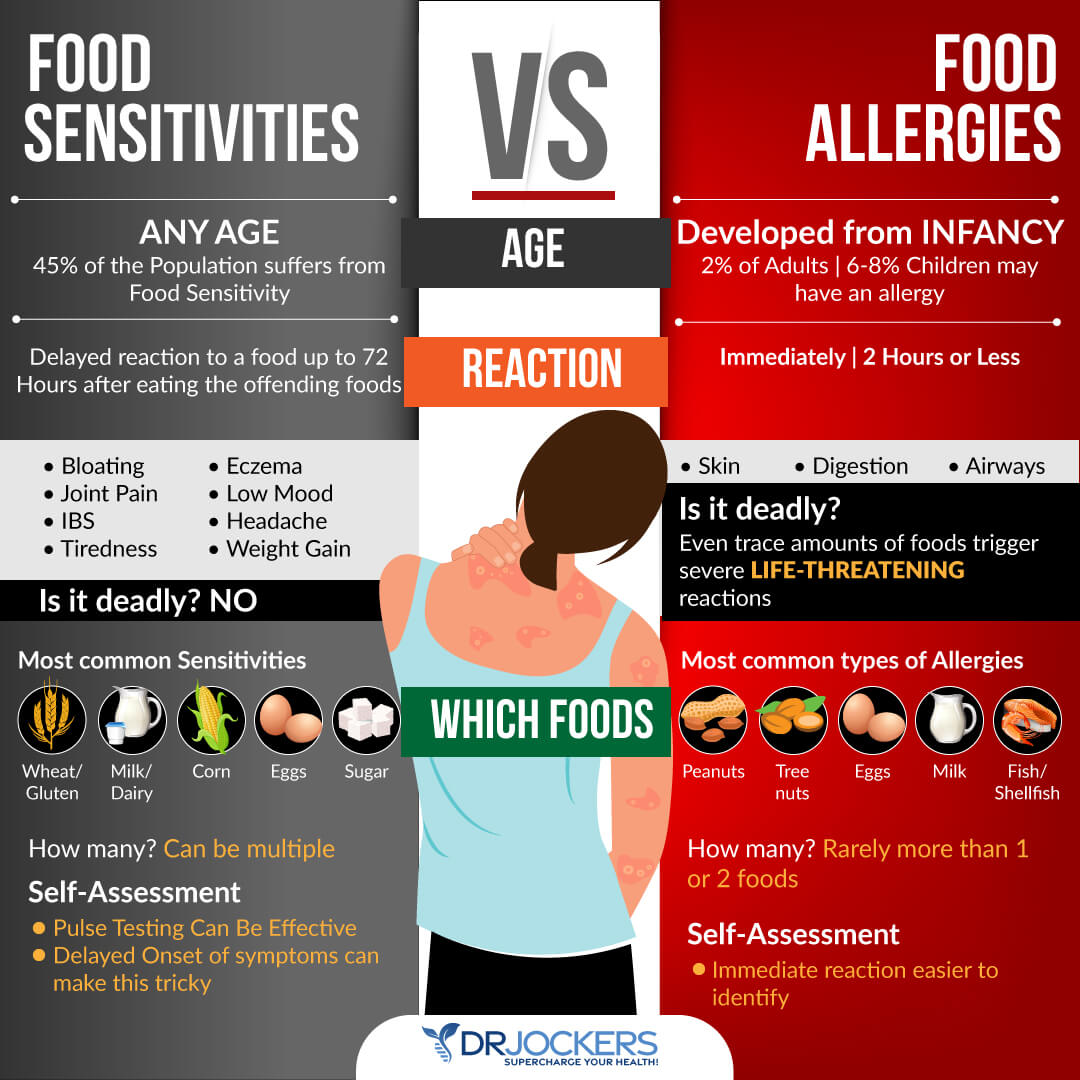
Histamine Intolerance
Histamine is a chemical that is responsible for removing allergens from your body as part of your immune response, triggering stomach acid, supporting digestion, and communicating with your brain. In a healthy body, your body releases certain enzymes to break down and remove histamine build-up.
But if you have too much histamine in your body due to a high-histamine diet, nutrient deficiencies, mast cell activation syndrome, methylenetetrahydrofolate reductase (MTHFR) mutation, gut infections, leaky gut syndrome, or other reasons, your body won’t be able to keep up, leading to excess histamine. Histamine intolerance means that your body has too much histamine.
This can lead to sinus congestion and other symptoms all over your body, including allergies, skin problems, headaches, sleep issues, anxiety, digestive issues, hormonal problems, and more. You may learn more about histamine intolerance by reading this article (8).
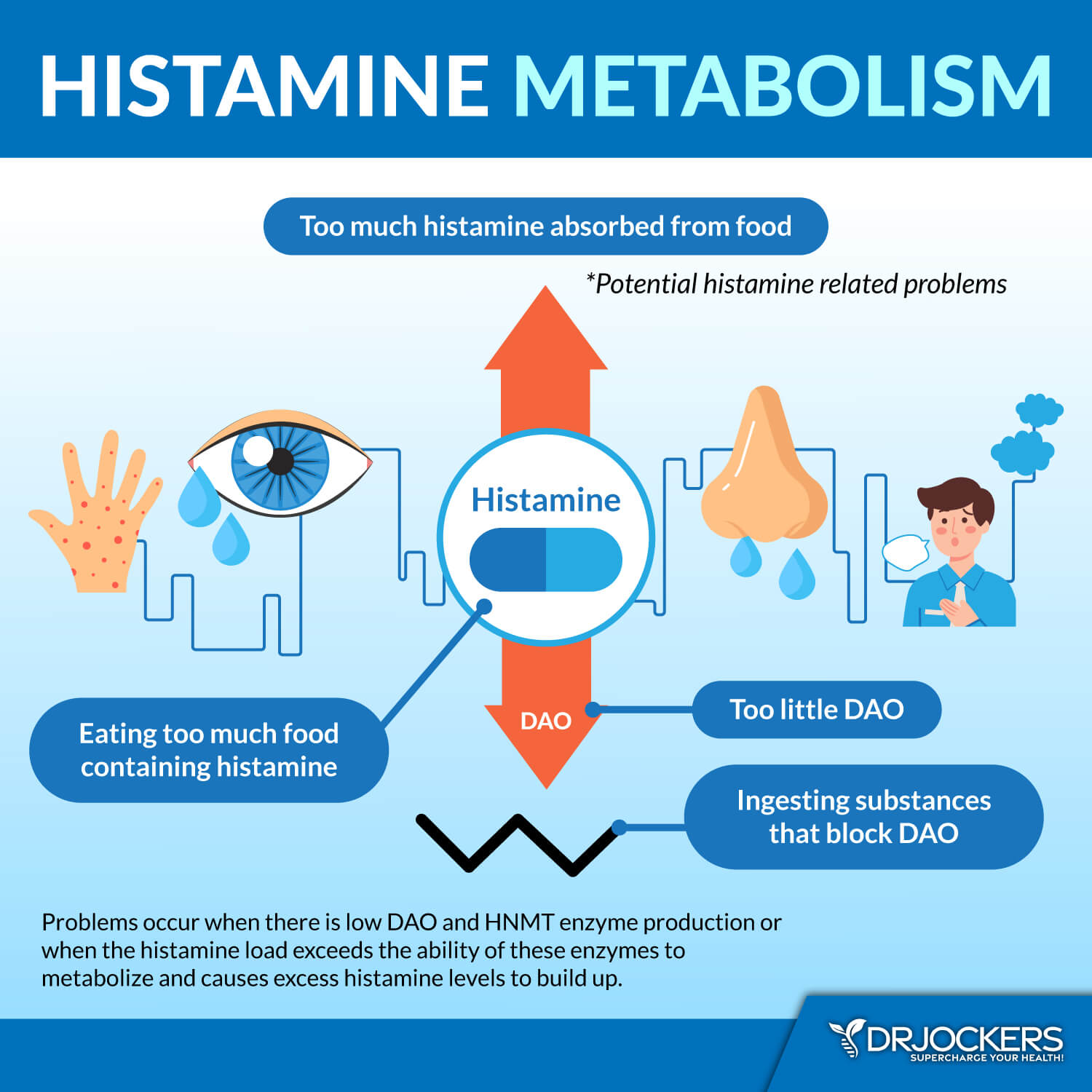
Natural Support Strategies
If you have sinus congestion, you can support your immune health through natural support strategies. Here are my favorite natural support strategies for sinus congestion I recommend to my patients, friends, and family.
It is important to know that not all of these strategies are FDA approved to prevent, mitigate, treat, or cure any health conditions and shouldn’t be confused as such. With that said, these strategies can be helpful for the overall health of your immune and respiratory systems.
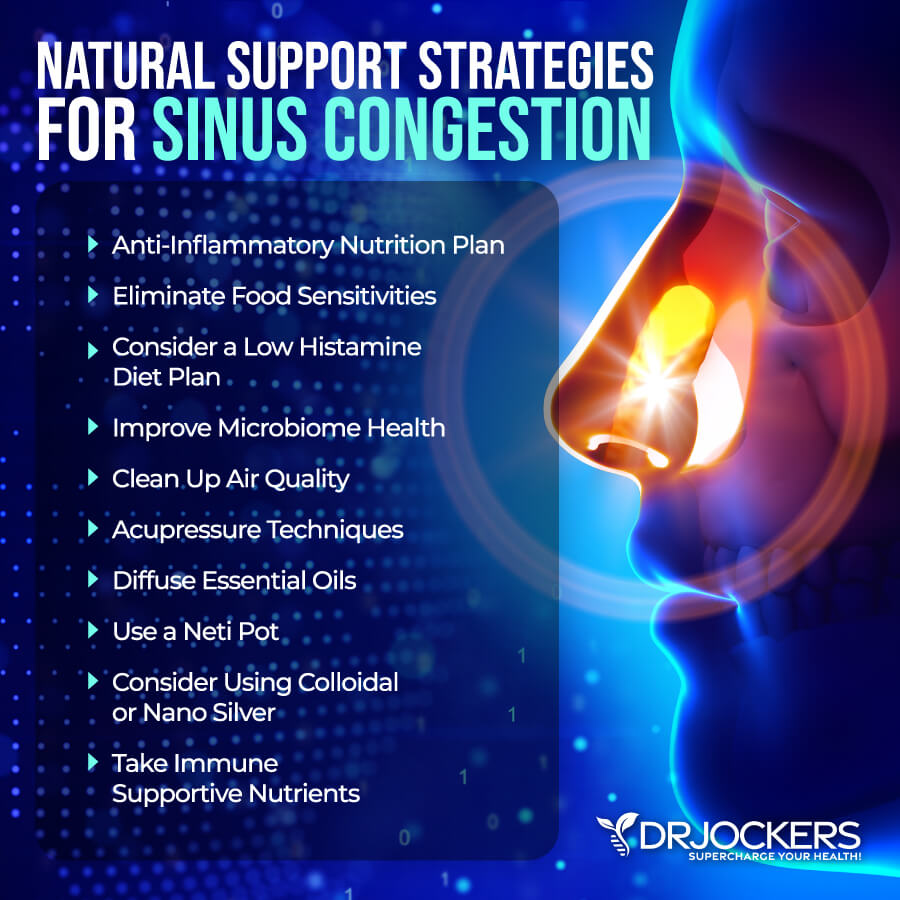
Anti-Inflammatory Nutrition Plan
As a 2011 paper explained, chronic rhinosinusitis is characterized by chronic sinus congestion and related symptoms for 12 weeks or longer as a result of chronic sinus inflammation. This chronic inflammation may develop due to fungi, viruses, bacteria, airborne irritants, and allergens that I will discuss in later sections, but also as a result of your diet.
Eating an inflammatory diet may lead to increased symptoms, while an anti-inflammatory diet may reduce your symptoms and support your recovery. Eliminate inflammatory foods, including refined sugar, refined oil, high-carb meals, sodas and sugary drinks, artificial ingredients, deep-fried food, junk food, and processed foods.
Eat a diet rich in anti-inflammatory foods, including greens, vegetables, herbs, and spices, low glycemic index fruits, fermented foods, healthy fats, pasture-raised beef, poultry, and eggs, and wild-caught seafood. To learn more about the anti-inflammatory diet, I recommend reading this article (9).
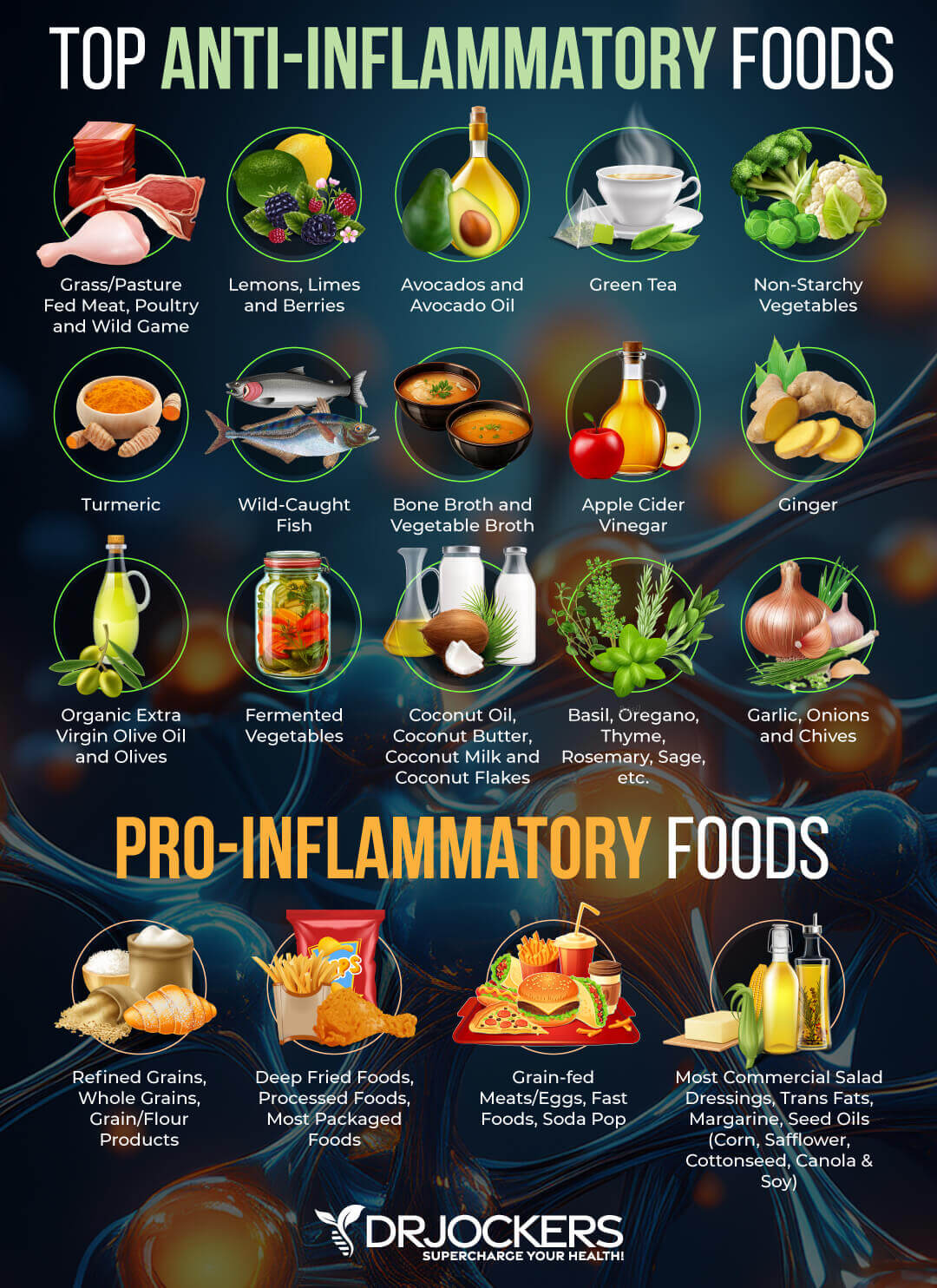
Eliminate Food Sensitivities
If you have chronic sinus congestion, I recommend that you identify and eliminate all food sensitivities. To identify your food sensitivities, you can try a pulse test I talked about in this article or an elimination diet.
To do an elimination diet, remove all common food sensitivities, including wheat, gluten, soy, fish, shellfish, eggs, dairy, peanuts, and tree nuts, as well as any other foods that you may think can be triggering. Eliminate these foods for two to four weeks, then introduce them slowly one by one.
Keep a food diary to record your meals and any symptoms. Leave two to three days between each introduction and watch your body for reactions. If you notice any negative reactions, immediately remove this food. You may reintroduce one food, two, or three times to check for false-negative or false-positive reactions. The foods that you are continuously reacting to with any symptoms, you are sensitive to, and need to remove from your diet (7).
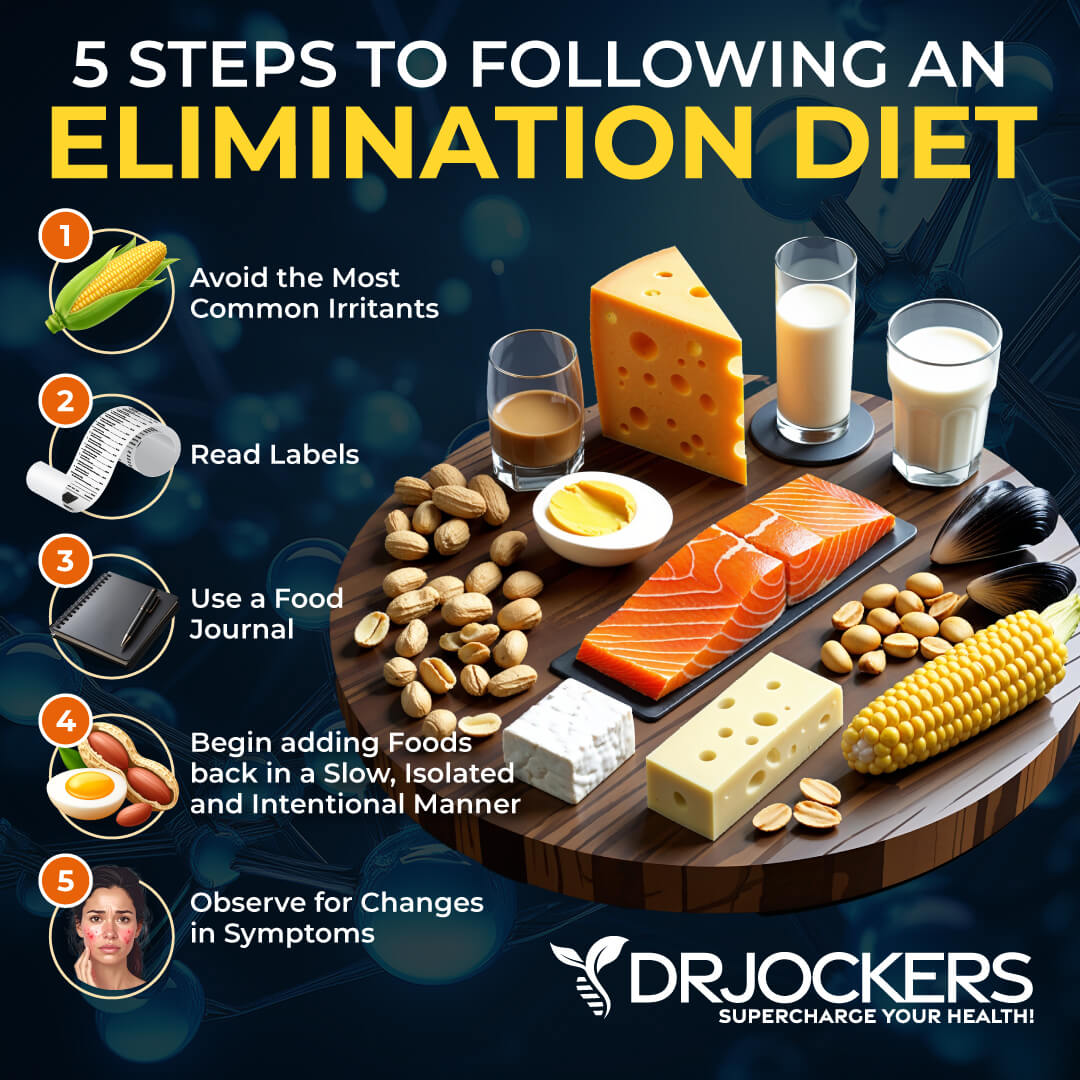
Consider a Low-Histamine Diet
As you’ve learned earlier, histamine sensitivity may be the reason behind your chronic sinus congestion. The best way to see if histamine sensitivity is the culprit behind your issues is to try a low-histamine diet.
Eliminate high-histamine foods, including eggplant, spinach, tomatoes, citrus, processed and smoked meats, dried fruits, vinegar and vinegar-based foods, fermented foods, soured foods, nuts, and shellfish.
Do a two-week trial to see if your symptoms improve. If your symptoms improve, you may try to reintroduce these foods one by one to see if you can tolerate any of them; otherwise, continue following a low-histamine diet (8).
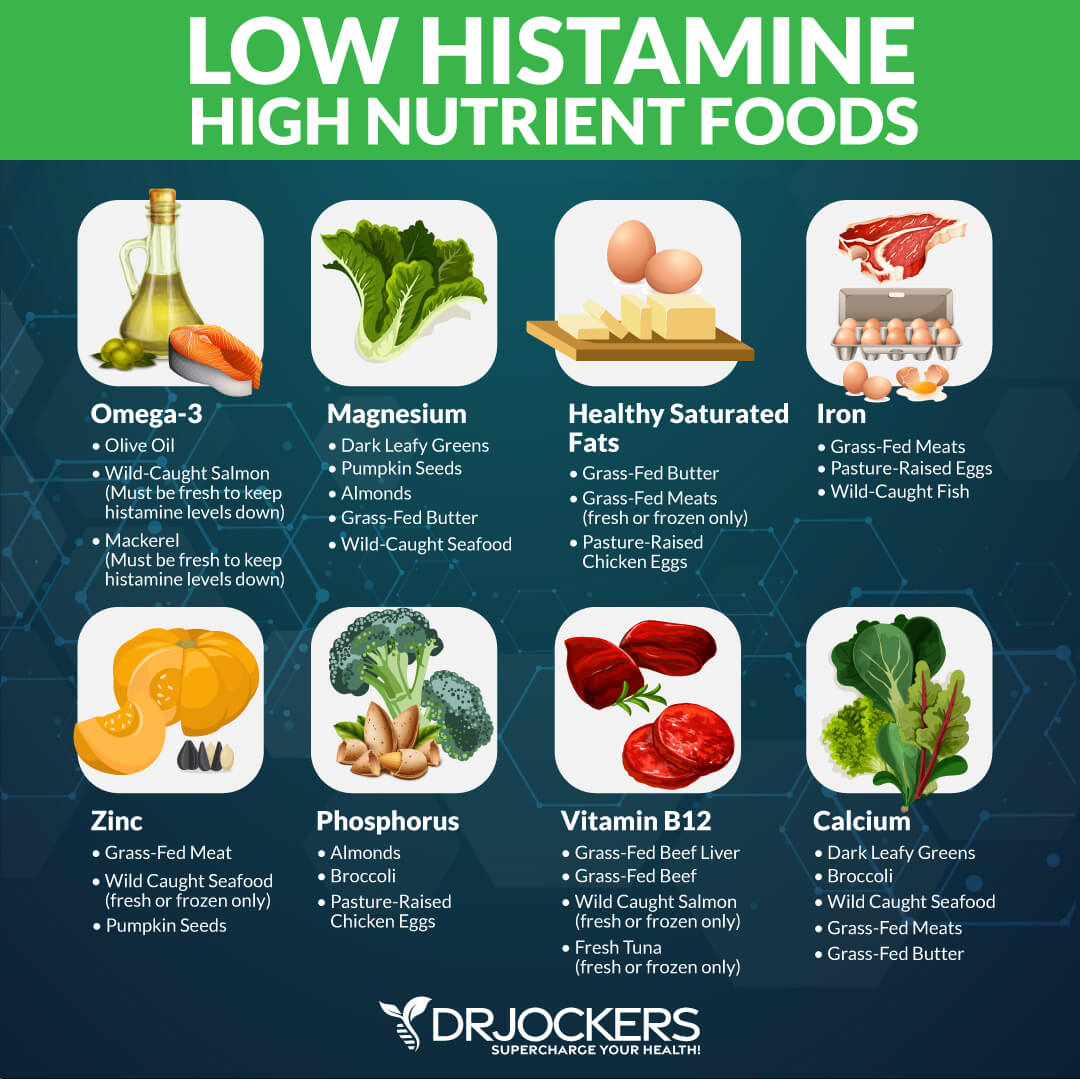
Support Gut Microbiome Health
According to a 2018 study, your gut microbiome may play a critical role in developing chronic sinus congestion. Reducing bad bacteria and improving your gut health is critical for your immune system and may reduce your symptoms.
While eating a gut-friendly anti-inflammatory diet is critical for gut health, I also recommend that you take high-quality probiotics and try Gut Repair for gut dysbiosis, leaky gut syndrome, and poor gut bacterial balance. To learn more about the importance of gut health, I recommend reading this article (10).
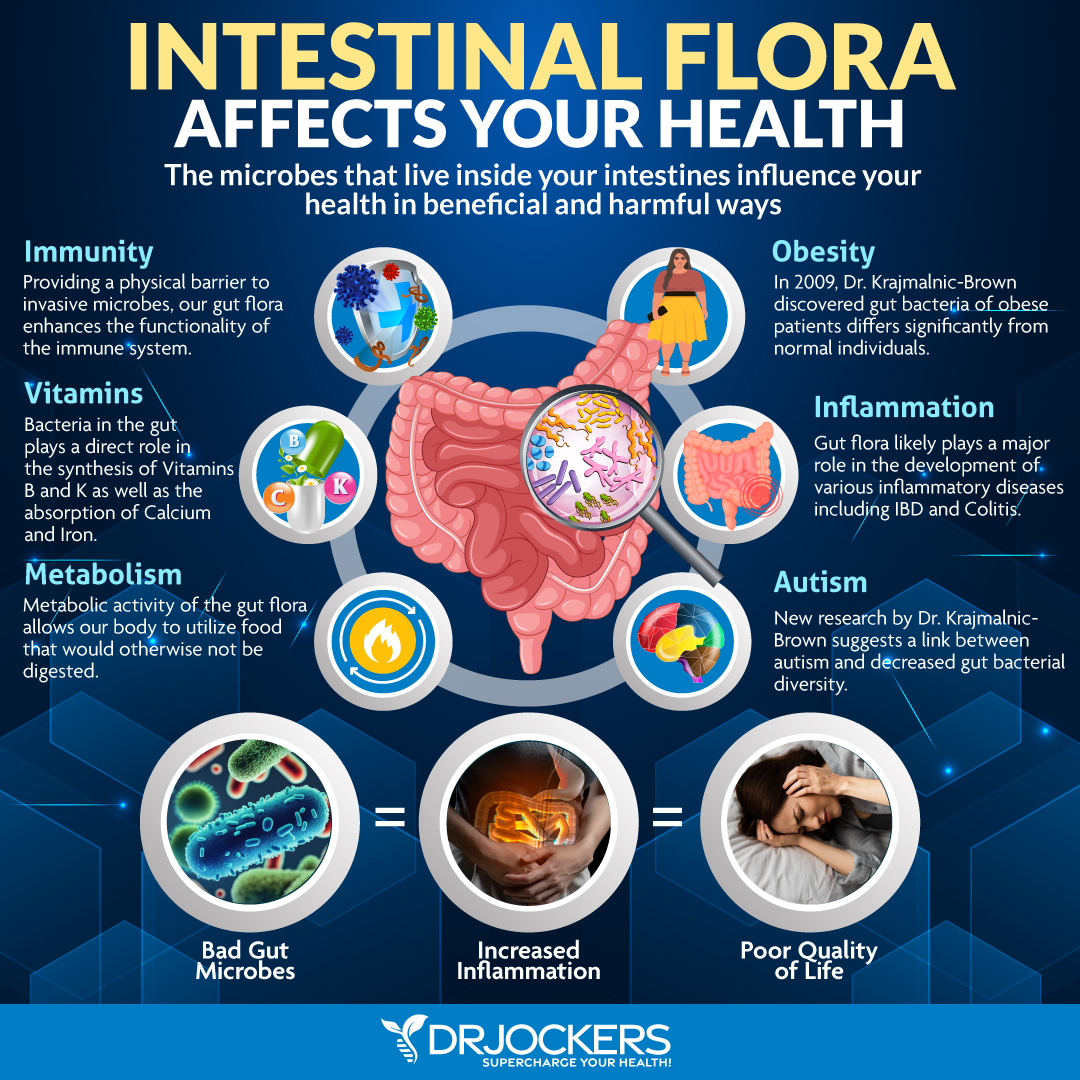
Clean Up Your Air Quality
Reducing your risk of environmental allergens is critical for improving your health if you have nasal congestion. Make sure that your house is mold-free. If there is mold in your house, make sure that you get professional mold remediation or move to a mold-free home. Vacuum your home regularly. Invest in a high-quality air purifier to lower your exposure to dust, pollen, and other allergens in the air.
A 2018 study on 46 individuals with self-reported allergies found that using air filtration made a statistically significant difference in nasal allergy symptoms from circulating indoor allergens. I personally use and highly recommend Air Doctor for air purification.
Put plenty of natural plants in your home to increase fresh oxygen around you. Avoid using conventional toxic cleaning, beauty, and body products, and replace them with natural, organic, and DIY alternatives (11).
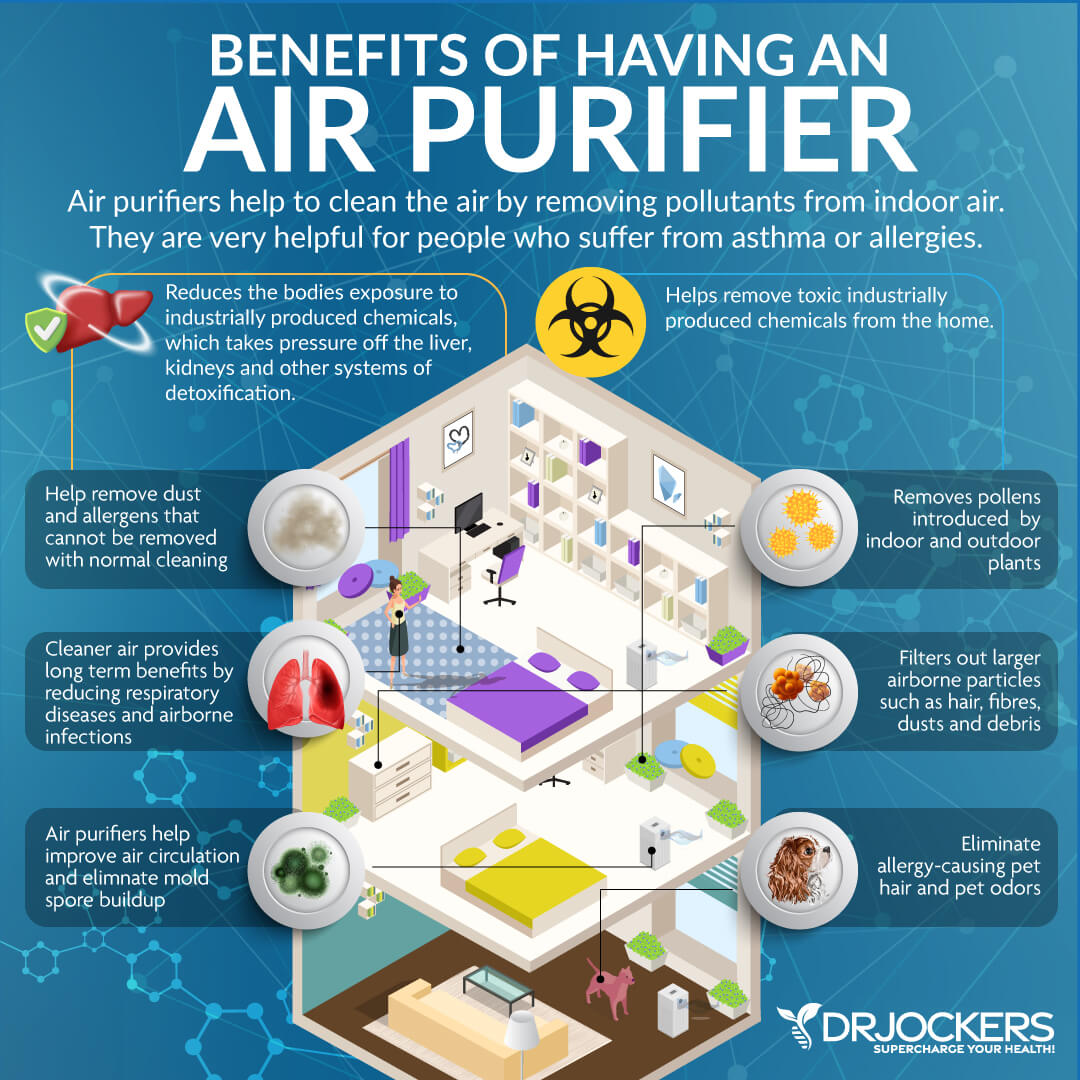
Acupressure Technique
For immediate relief from sinus congestion, you may try a simple acupressure technique. Place and push your tongue against the top of your mouth. Instead of aiming for a specific point, simply push it flat against the roof. Then put your finger between your eyebrows and apply some pressure.
Hold this position for about 20 seconds. Chances are, you will feel your sinuses beginning to drain. Remember, this strategy is only for temporary symptom relief that you can use alongside my other recommendations for immune support.
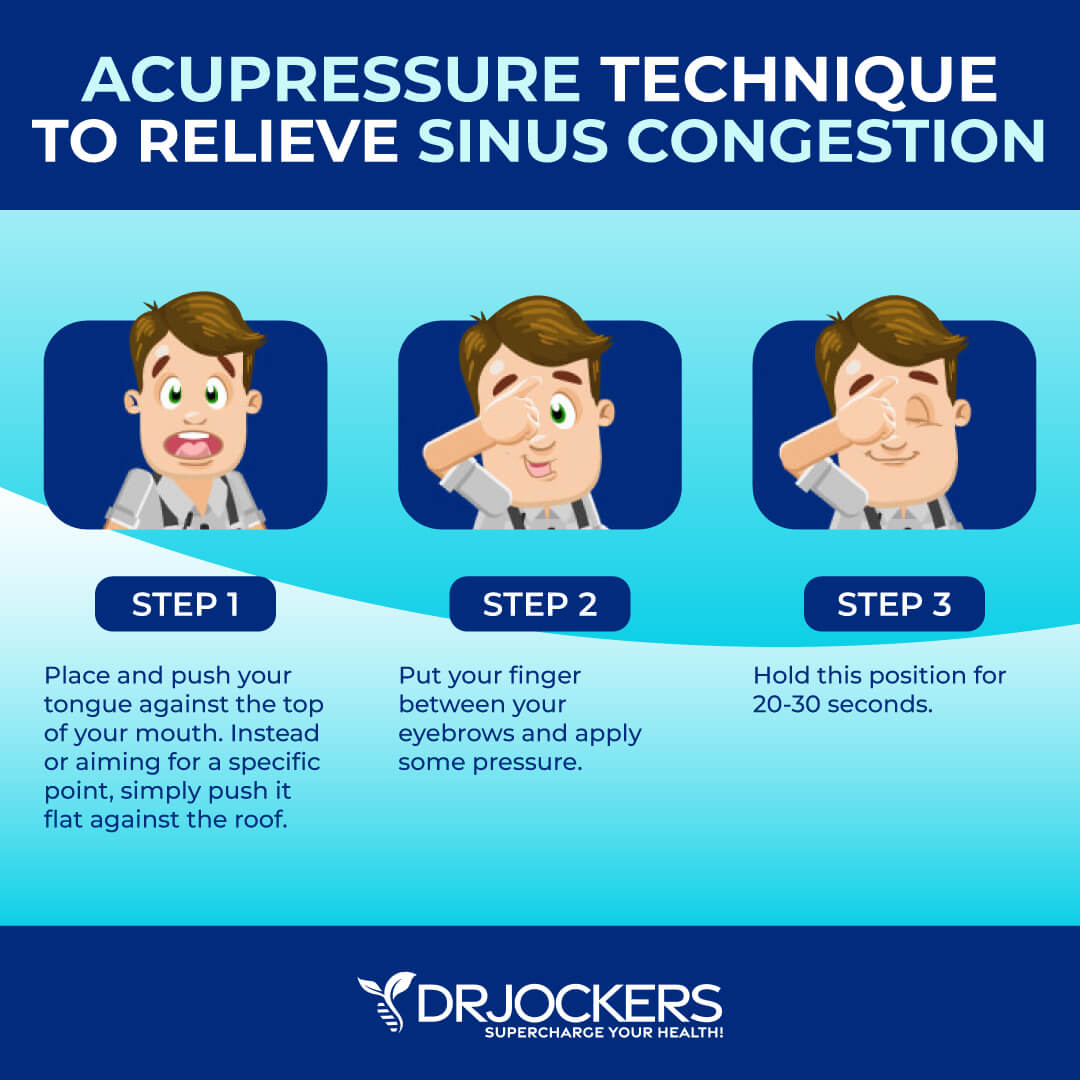
Diffuse Essential Oils
Diffusing essential oils is another strategy that may help you with symptom relief. Peppermint oil, eucalyptus oil, and oregano oil may be particularly supportive. A 2014 study has demonstrated that peppermint oil may be beneficial for inflammation, and a 2015 study has shown that it may help to fight bacteria responsible for sinus congestion.
According to a 2009 study, eucalyptus oil was more effective than a placebo for sinus issues. According to a 2009 double-blind, randomized, and placebo-controlled trial, carvacrol, a component of oregano oil, may be effective against bacteria causing sinus congestion (12, 13, 14, 15).

Use a Neti Pot
Netti pots are small personal hygiene appliances that are shaped like a teapot. They are used for nasal irrigation which allows you to pour a saltwater solution into your nasal cavity to help relieve symptoms of nasal congestion. According to a 2009 scientific manuscript, using neti pots is a safe way to improve acute and chronic respiratory conditions, such as sinus congestion, with no to minimal side effects.
Using neti pots helps to flush your sinuses, relieve blockages, remove nasal debris, keep the mucous membrane moist, and improve breathing. It is important that you carefully follow the instructions on your neti pot and clean your neti pot carefully before using it to avoid infections. If you don’t have a neti pot, you may use a squeeze bottle instead (16).
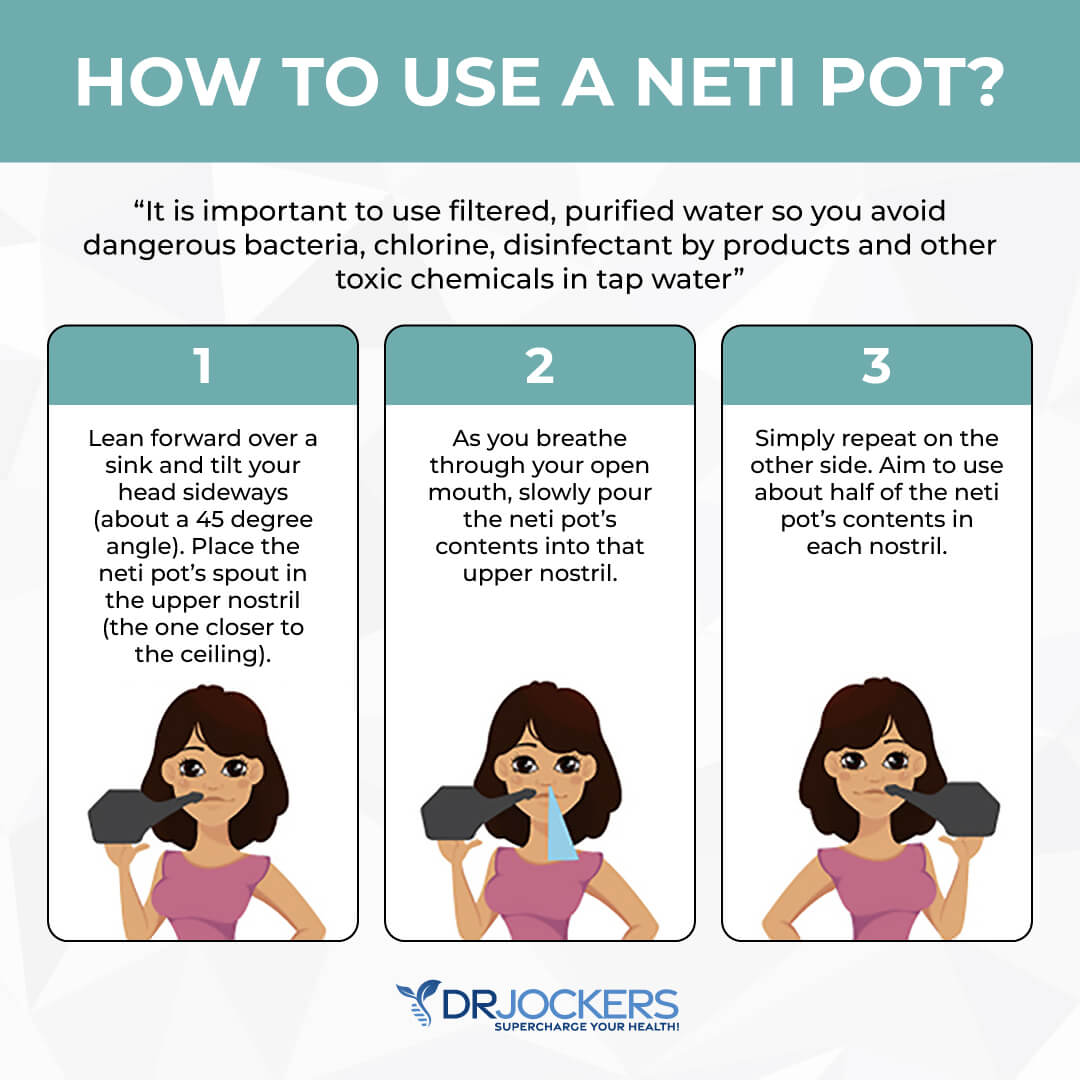
Consider Using Colloidal or Nano Silver
Colloidal silver is made out of nanometre-sized silver particles that create a highly effective form of silver. Colloidal silver is created by mechanically grinding metallic silver into tiny silver particles or by converting silver salts into small silver crystals with the help of an electrochemical reaction. Two studies from 2011 have demonstrated the potential antimicrobial, antibacterial, and antifungal effects of colloidal silver nanoparticles.
A 2013 study has shown that it may have antiviral benefits against the human parainfluenza virus, which may lead to upper-respiratory infections and sinus congestion. Colloidal or nano silver spray may reduce fungal or microbial growth in the nasal cavity.
For immune and upper-respiratory health support, I recommend Silver Spray. I recommend one spray in each nostril every few hours until symptoms are cleared. To learn more about the potential benefits of colloidal silver, I recommend reading this article (17, 18, 19).
Improve the Sinus Microbiome
Within your sinuses, you have a microbiome that supports the mucus membrane and immune system. Sinus congestion is a warning sign of an overgrowth of pathogens within the sinus cavity.
To help clear this up, silver can be used, and then I also recommend a bioactive carbon-based sinus spray that helps break down and detoxify bacterial and fungal biofilms. This is why I like Nasomin Nasal Iodine, which is made up of mineral-rich bioactive carbons and iodine to help harmonize the respiratory microbiome.
Nasomin Nasal Iodine is a rinse for clearing dust, pollen, and other airborne environmental irritants we’re exposed to every day. It’s your microbiome-friendly ally in caring for the respiratory system. Think of it as strengthening your very first line of defense.
Immune-Supportive Nutrients
To further support your immune health, there are a variety of immune-supportive nutrients you may try. Here is what I recommend:
Vitamin D
Vitamin D is absolutely necessary for your immune health. According to a 2016 study, vitamin D deficiency may increase the risk of nasal polyps and sinus issues. A 2011 and a 2013 study have demonstrated the benefits of vitamin D for your immune system health.
Sunshine is the best way to get enough vitamin D, however, our indoor lifestyle and in some places, cold climate and cloudy weather, make it practically impossible to meet all your requirements. Taking a good quality vitamin D3 supplement on a regular basis and testing your 25-OH vitamin D3 levels a few times a year to make sure it is in the optimal 50-100 ng/mL range is recommended (20, 21, 22).
For maximum immune support, I recommend taking Vitamin D/K2 Power daily. I usually recommend around 1,000 IU’s per 25 lbs of body weight to help get your levels up to the optimal range and keep them there.
For some individuals who are very deficient, they may need larger dosages, such as 2,000 IU per 25 lbs of body weight for a period of time. If you are getting a lot of whole-body sun exposure, you may need little to no supplementation.
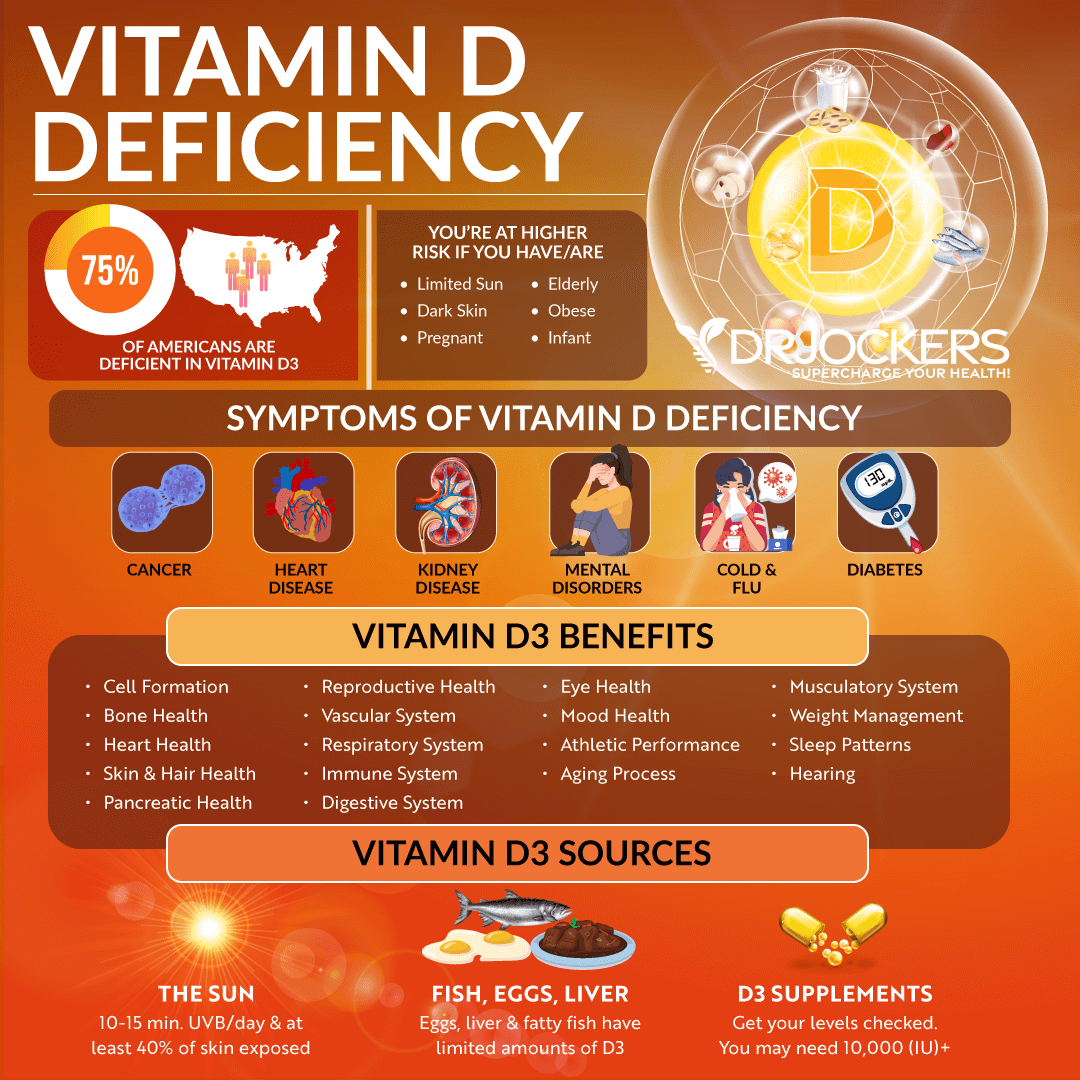
Zinc
Zinc is critical for your immune health. According to a 2008 study, zinc is important for the function of cells mediating innate immunity, neutrophils, and NK cells, and according to a 2015 meta-analysis, it may be helpful for the common cold.
I recommend eating a zinc-rich diet full of pasture-raised beef, grass-fed poultry, oysters, wild-caught salmon, chickpeas, lentils, pumpkin seeds, cashews, and asparagus (24, 25). If you deal with a compromised immune system, it can be very helpful to take an extra 20 mg of supplemental zinc daily to support your immune response.
Zinc is important to take with meals, otherwise, you may experience nausea. Our Zinc Charge uses a highly bioavailable zinc glycinate form, which has been shown to absorb better than most other forms of zinc.
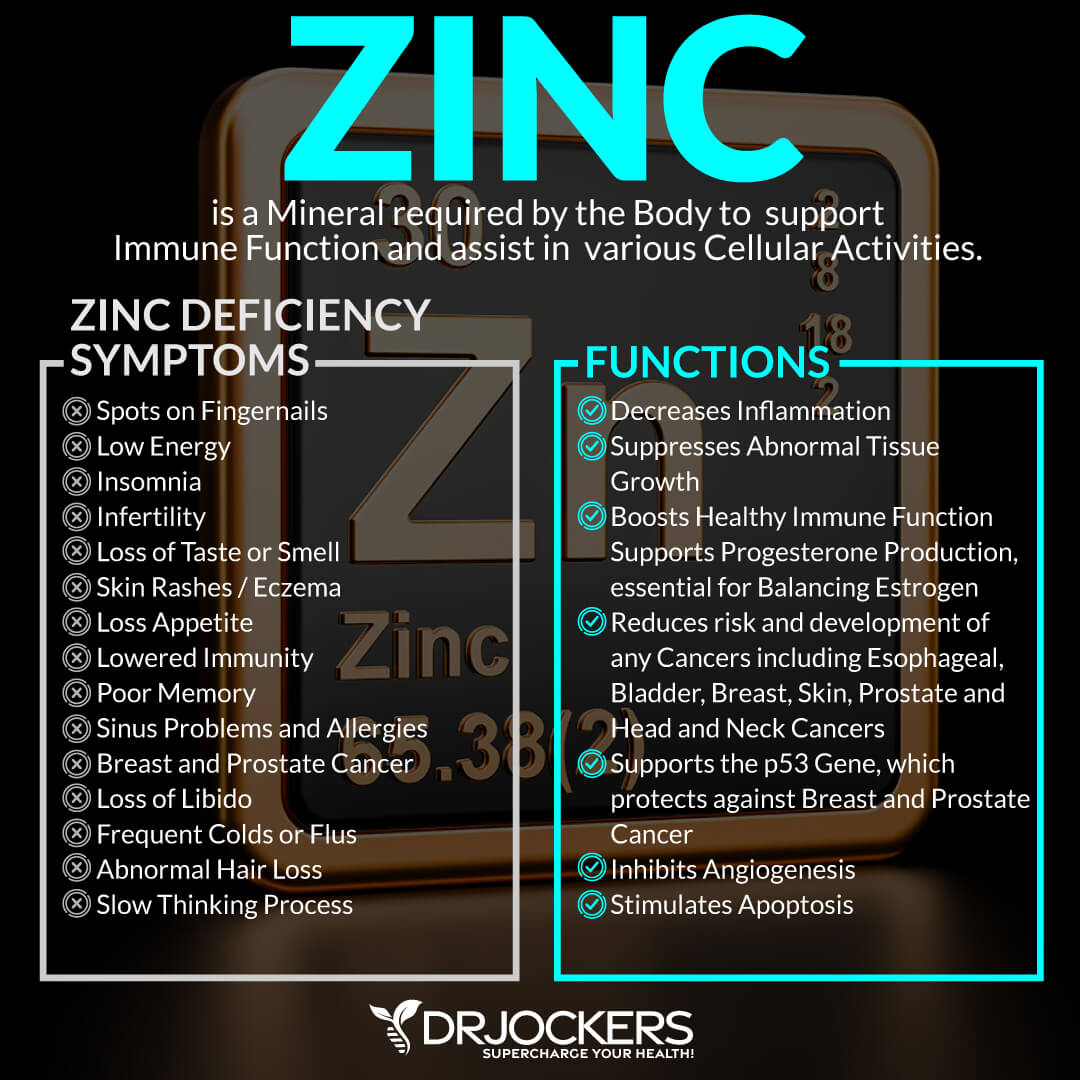
Vitamin C
Vitamin C is one of the most commonly known immune-supportive nutrients. A 2013 study has shown the antioxidant benefits of vitamin C on nasal issues (23).
To boost your vitamin C levels, I recommend using a good quality vitamin C supplement daily along with eating foods rich in vitamin C, including citrus, kiwi, pineapple, tomatoes, green and red peppers, broccoli, and Brussels sprouts.
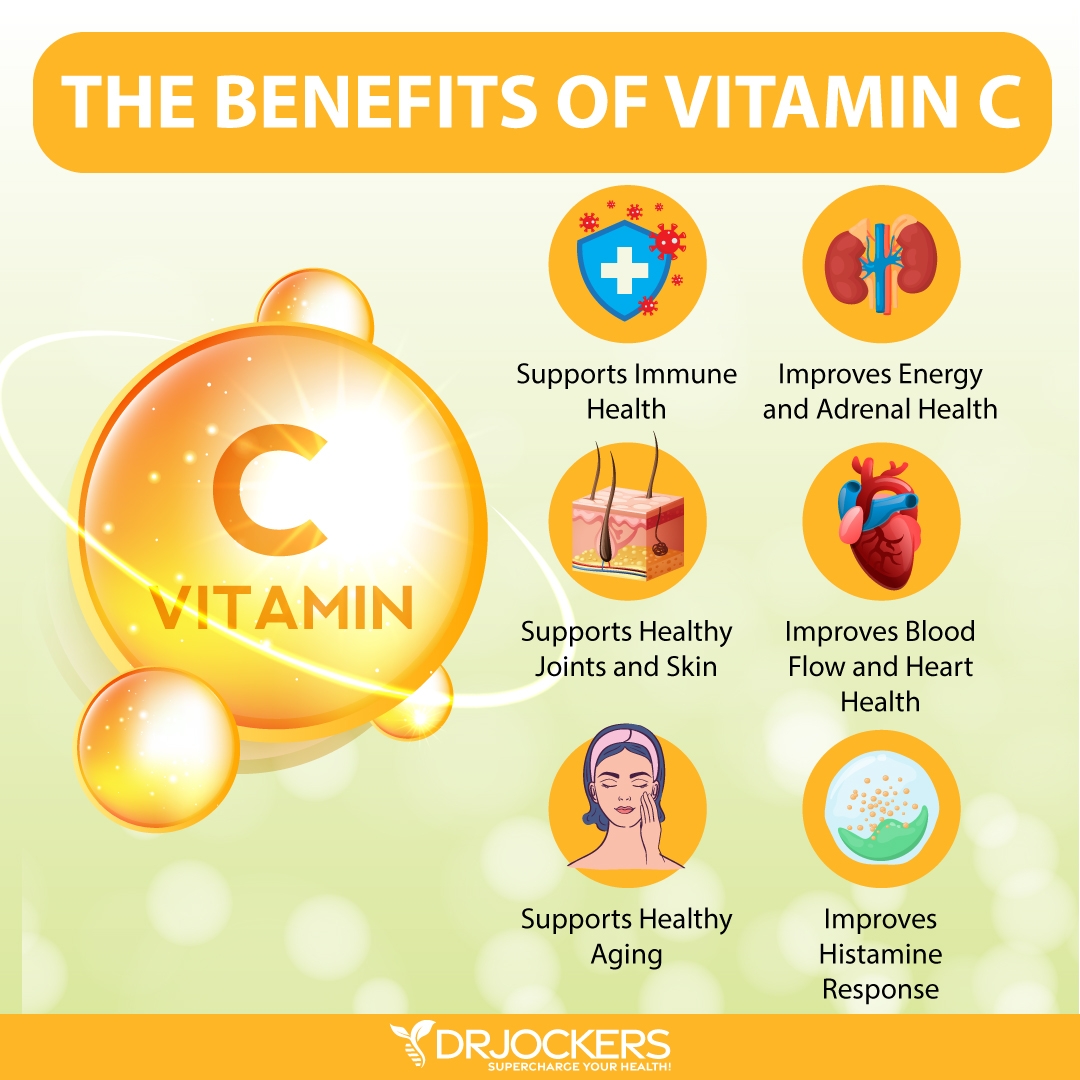
Bioflavonoids
Bioflavonoids, also known as flavonoids, are phytochemicals that are often found together with vitamin C in nature and are one of the most interesting and powerful biological compounds. According to a 2016 systematic review and meta-analysis, bioflavonoids may be beneficial for respiratory conditions.
I recommend eating foods that are rich in bioflavonoids, including lemon, lime, oranges, cherries, grapes, strawberries, bell pepper, garlic, Brussels sprouts, and broccoli (26). Our Immunocharge product is specifically designed to provide you with optimal dosages of the most important immune modulating nutrients and compounds, including vitamin C, bioflavonoids, zinc, vitamin D, vitamin K2, and more.
The synergy of these key nutrients and compounds strengthens immune function and improves the process of inflammation. Each Immunocharge capsule contains the same amount of powerful immune-modulating compounds. These include quercetin, resveratrol, vitamin D, vitamin A, selenium, zinc, vitamin C, N-Acetyl Cysteine, vitamin K2, and magnesium.
Final Thoughts
A chronic stuffy and runny nose from chronic sinus congestion is very common. Yet, there is no reason for you to deal with these uncomfortable symptoms anymore. Try my natural support strategies to improve your immune health and overall well-being.
If you want to work with a functional health coach, I recommend this article with tips on how to find a great coach. On our website, we offer long-distance functional health coaching programs. For further support with your health goals, just reach out—our fantastic coaches are here to support your journey.
Inflammation Crushing Ebundle
The Inflammation Crushing Ebundle is designed to help you improve your brain, liver, immune system and discover the healing strategies, foods and recipes to burn fat, reduce inflammation and thrive in life!
As a doctor of natural medicine, I have spent the past 20 years studying the best healing strategies and worked with hundreds of coaching clients, helping them overcome chronic health conditions and optimize their overall health.
In our Inflammation Crushing Ebundle, I have put together my very best strategies to reduce inflammation and optimize your healing potential. Take a look at what you will get inside these valuable guides below!
Sources in This Article Include:
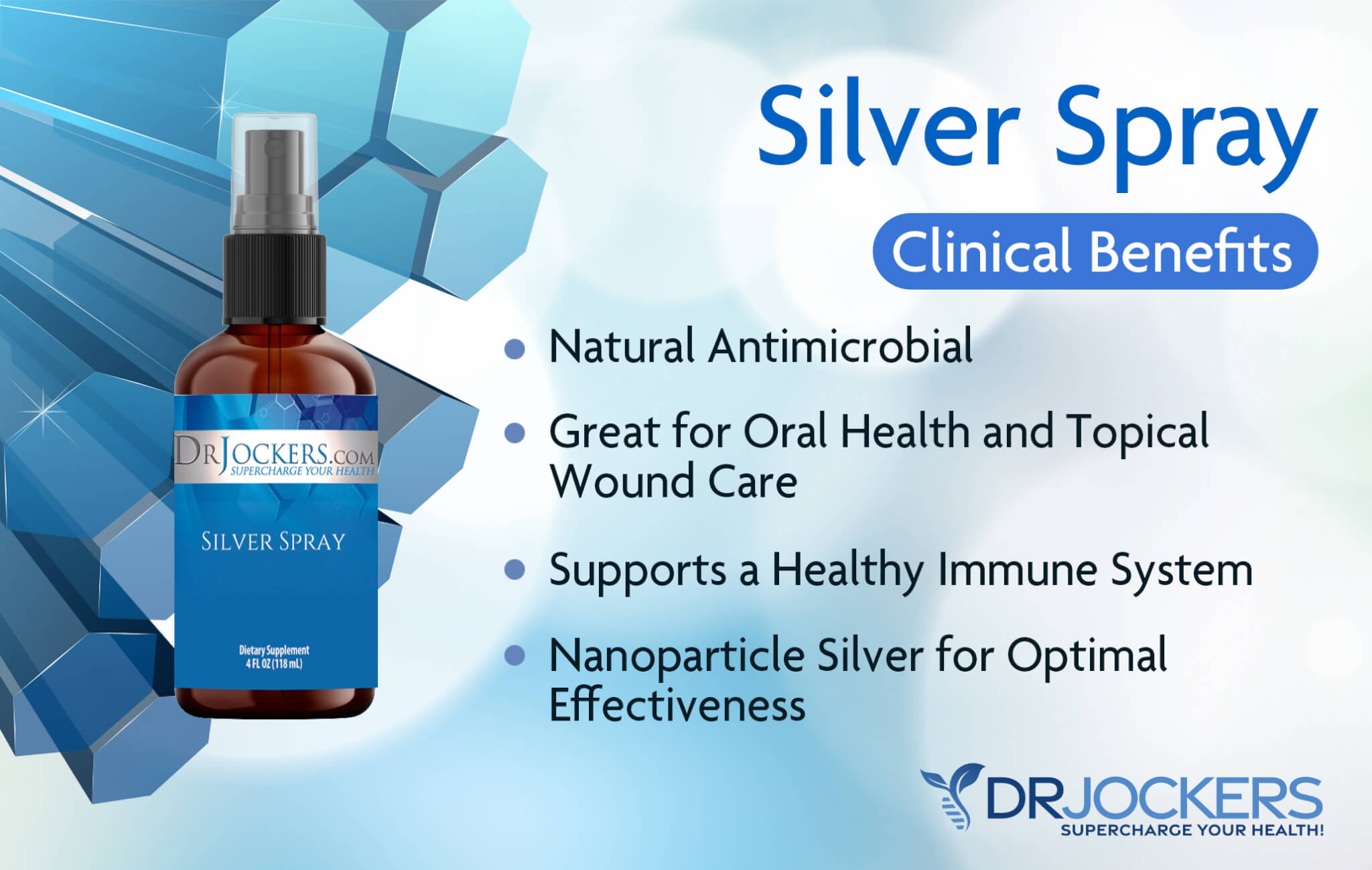






I am understanding that root camels can also cause sinus problems? Have you seen this?
Yes root canals can be an issue. https://drjockers.com/root-canals/
Calcified teeth, impacted teeth, root canals, and amalgams can cause sinus issues. Go find a Biologic dentist at http://www.IAOMT.org
You kidding ??😝
I had appointments with both a lung doctor and my family doctor. Nasal sprays were
recommended to be used repeatedly as needed. In addition to the symptoms described,
I also have gigantic sneezes during the day and at times non stop when I had a cold.
As far as mold, I did have someone come out to test the basement as when this house
was built, the builder did not use plastic covering under the basement and garage floors.
I had someone check for mold but didn’t receive a report so called and learned that
the contractor forgot to take it out of his trunk. It may have been in there for at least a
week. Would this have killed any mold removed from the basement as told negative.
Yes mold can be a major issue with this so I would get that tested.
I also use a dehumidifier in the basement during warm weather. As far as the finding of
foods that trigger problems, I was tested by a food allergist and learned I was allergic
to everything tested. Same was true for environmental allergies. My mother had same.
I had a foundation company put in a drainage system in the basement floor next to cinder block walls and it drains
to the outside. One positive is that only one side of my nose gets stuffy at a time. I was
checked for deviated septum and told it does not exist. Also had wax buildup in my ears
and saw an ear specialist. That did not go too well as he used what I called a vacuum
cleaner for removal of it. As I also have tinnitus, that intensified it. Was advised to get a
hearing aid as eligible for one. As I have Sjogren’s disease, the severe dryness is increasing the mucous in my nose and very dry mouth so use mouth sprays and rinses plus eye moisturizer and lozenges.
moisturizers. Other than that all organs are now being affected by autoimmune diseases.
Great work Dr. Joker. i think that also integration (zinc, vit.c, omega 3 and vit d are very important). Also confirm the instamine issue. Also a good microbiome is necessary.
i’ve experienced years of sinus problems in childhood cured with antibiotics…a disaster for my microbiome and for my health.
sometimes i experience some sinus headache after a very stresfull day…so also stress and tension could be an issue
Yes these are all important. Thanks for sharing!
Over a year ago, while researching covid prevention methods, I came across suggestions to use nebulized hydrogen peroxide to prevent or eliminate nasal & respiratory infections. Some doctors who were treating hundreds of “Covid” patients used no mask or vaccine, but protected themselves 100% with peroxide. To save a few bucks, I bought a bottle of saline nasal spray, dumped out the saline, and filled the bottle with 3% peroxide. (If the minor sting from that bothers you, just dilute it). I never got covid, and have not had colds or flu for years, but I do have sinus congestion from pollen allergies. Peroxide inhalation provides immediate relief, and clears my sinuses in minutes. It is really amazing. In addition to inhaling a spray in one nostril at a time, I also do 2-3 squirts of mist into my mouth while inhaling deeply. This will relieve nasal congestion whether due to mold, bacteria, viruses, or allergies. Thank you so much for your wonderful articles.
Great to hear that and thanks for sharing! Blessings to you Dave!
I don’t have any allergies to foodstuff.
About two years ago I developed a serious post nasal drip.
Antihistamines, inhaling eucalyptus essence, taking zinc
everyday, 3% hydrogen peroxide nebulization, nasal
washing do not help. Post nasal drip is classified by many people
as an allergy, but allergy testing does not reveal it.
In most of my life I did not have any allergies of any kind.
Should I visit a, ear-nose-throat specialist if I have any nasal polyps?
So what is answer?
Sorry to hear about these challenges Ian. Here is a helpful article on Nasal Polyps: https://drjockers.com/nasal-polyps/
Hello Dr Jocker. Just wanted to know what you think about Serrapeptase for sinus congestion. Enzymes that eat dead protein.
Yes this can be very helpful for reducing inflammation in general!
I suffered with sinus /post nasal drip since i was about 21 years old.The problem is when it turns into chest infection.Being to many doctors and specialist.As a child doctors operated on me for my nasal problems.Years later it was discovered that i have damage on one side of nostril-the side i always have sinus issues.It was recommended by some specialist to do surgery on it and some did not advise it as nasal passages is sensitve area-damage done due to me been a amateur boxer as a teenager.I am now 63 years of age.11 months ago i started to spray colloidal silver in my nose.For me it has been a miracle.No more post nasal drip-and that after about 42 years.
My nasal passage has never felt so good.I did go off it for a week to see the effect-post nasal drip did begin to start again but not as bad as before.Using colloidal silver has made a big difference in my life. It is also good against virus-including covid-found good articles and studies on it.
A certain Dr Rimma from USA helped one African country with Ibola virus-with great success.
Llewellyn from South Africa
Thanks for sharing!
eyebright & golden seal effective
Thanks for sharing!
Hi Dr Jockers
I am writing from Europe (Spain)
First of all I would like to thank you for your advisory work to improve people’s health.
I had been having sinus problems for a few days and I didn’t know what to do
And your article on how to improve sinusitis appears in my mail.
To date, the improvement has been spectacular.
Thank you
Great to hear that Pascual!!
Hi I would just like to say after having a virus nov 2019 which I am convinced was covid , I have been suffering with sinus congestion which can cause sleep disruption . It clogs my throat I constantly try to clear my throat and sinuses all night .which after finally falling asleep awake tired and with a head ache . Doctors gave me antibiotics one after the other to no avail . Been waiting all year to see ear nose and throat specialist . Tried inhalers , sprays etc still waiting ,do you think it’s from the virus ,and should I try colloidal silver spray . I have an air filter in my bedroom , thank you for listening .Victoria
Thanks a lot, Dr Jockers,
I have been incorporating all your med advice during the recent years. I have chronic casual sinusitis that comes in all seasons, but each time for a period of under 2–4 days. Several years ago, I removed it by taking successive no. of 320 mg aspirin. I started with a couple of the tablets, and according to outcomes, took a single tablet each 4–6 hours. I knew due to its many adverse effects -as all NSAIDs- it was not a recommended practice, but that was the only effective remedy that I did follow (together with nasal wash)!
Recently, I use peeled off onions as a respiratory anti-infection matter. I put the sliced pieces in a small open container in the room space. I keep those near my sleeping area as well. Moreover, I let some onion slices together with peeled off orange and tangerine skins in a water pot with continuous low gas flame that evaporates the product. As a complementary inhaler, I add some eucalyptus or menthol drops in the pot. The final result is not perfect but does well in about 24–48 hours, and it seems much safer as I know.
Also, I keep an eye not to confront wind/breeze locations/occasions, especially with sweaty head or after a bath. I generally use a thick forehead band from September until April, and in cold weather I wear on a hat!
Hello,
Is there a specific protocol for getting mold out of your sinuses if you have had a positive test?
Thank you!
Great article. I now take 15000 IUs a day spread thoughout the day and feel so much better. Also, make sure you up your magnesium because D3 (also take K2) will use up alot of magnesium. Don’t forget Quercetin for histamine too. The tongue thing does work for clogged sinuses, thanks.
Did I miss you mentioning vasomotor rhinitis? It is miserable. I gave up processed sugar, gluten and nightshades in 2023 to help with my inflammation. And it never seemed to help the rhinitis. Curious.